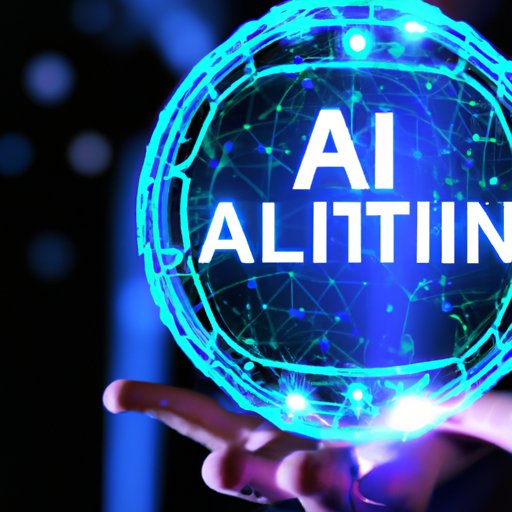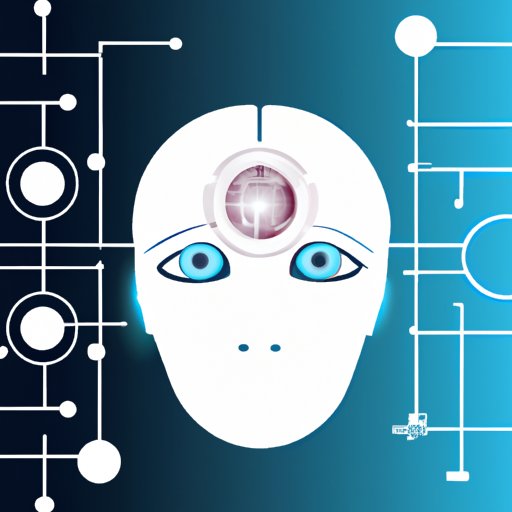Introduction
Artificial Intelligence (AI) is a rapidly developing field of technology that has already had an immense impact on the way we live today. From automated robots to self-driving cars, AI is all around us. But what exactly is AI and how does it work? In this article, we’ll explore the basics of AI and investigate the impact of AI on the technology industry, its potential benefits for businesses, and ethical considerations surrounding the use of AI technology.

Exploring the Basics of AI
Before delving into the implications of AI technology, let’s first define what AI is and explore how it works.
What is AI?
AI is a branch of computer science that seeks to create machines that can think and act like humans. Artificial intelligence is not a single technology, rather it is an umbrella term that encompasses many different disciplines, including robotics, machine learning, and natural language processing (NLP). AI systems are designed to be able to perform tasks that would normally require human intelligence, such as making decisions, recognizing patterns, and understanding language.
How Does AI Work?
At its core, AI is based on algorithms. An algorithm is essentially a set of instructions that a computer follows to solve a problem or complete a task. AI algorithms are designed to mimic the decision-making processes of the human brain. For example, when you type a query into a search engine, the AI algorithm will analyze your query and provide the most relevant results. Similarly, when you use a virtual assistant like Alexa, the AI algorithms will interpret your voice commands and respond accordingly.
Types of AI
AI technology can be divided into two main categories: narrow AI and general AI. Narrow AI is limited to performing specific tasks and is used in applications like facial recognition and autonomous vehicles. General AI, on the other hand, is designed to replicate human intelligence and is still in development. According to research by Gartner, “The development of true general AI is at least 10 years away.”

The Impact of AI on the Technology Industry
AI technology is having a profound impact on the technology industry. Let’s look at some of the key ways AI is transforming the industry.
Automation and Robotics
One of the most obvious impacts of AI technology is the automation of mundane tasks. AI-powered robots are being used in factories and warehouses to automate repetitive tasks, allowing businesses to reduce costs and increase efficiency. According to a study by McKinsey Global Institute, “automation could raise productivity growth globally by 0.8 to 1.4 percent annually.”
AI-Powered Cybersecurity
Cybersecurity threats are becoming increasingly sophisticated, and traditional security measures are struggling to keep up. AI-powered cybersecurity tools are being used to identify and block malicious attacks more quickly and accurately than ever before. According to a report by MarketsandMarkets, the AI-powered cybersecurity market is expected to grow from $9.7 billion in 2020 to $40.6 billion in 2025.
AI’s Role in Big Data
Big data is the massive collection of data generated by businesses, governments, and individuals. AI technology is being used to analyze and interpret this data to gain valuable insights that can be used to improve products, services, and operations. According to a report by IBM, “AI-driven analytics have the potential to unlock up to $2 trillion of value annually across 16 industries.”
Benefits of AI for Businesses
AI technology offers numerous benefits for businesses, including cost savings, increased efficiency, and improved customer experience. Let’s take a closer look at the potential benefits of AI technology for businesses.
Cost Savings
AI-powered automation can help businesses save money by streamlining processes, reducing manual labor, and eliminating costly errors. According to a study by Deloitte, “AI-enabled automation could reduce operating costs in the United States by up to $1.2 trillion per year.”
Increased Efficiency
AI technology can help businesses increase their efficiency by automating mundane tasks and providing actionable insights. For example, AI-powered chatbots can help businesses respond to customer inquiries faster and more accurately. According to a study by Oracle, “AI-powered chatbots can help companies reduce customer service costs by up to 30%.”
Improved Customer Experience
AI technology can also help businesses improve the customer experience by providing personalized recommendations and tailored content. For instance, AI-powered recommendation engines can help online retailers recommend the most relevant products to customers. According to a study by Salesforce, “AI-powered recommendations can lead to a 25% increase in sales.”
Ethical Considerations of AI Technology
AI technology also raises important ethical considerations. Here are some of the key ethical issues to consider when using AI technology.
Privacy Concerns
AI technology relies on collecting and analyzing vast amounts of data. The misuse of this data could lead to serious privacy violations. To ensure the privacy of individuals, businesses must implement stringent security measures and adhere to applicable laws and regulations.
Discrimination
AI algorithms are programmed by humans, which means they can be biased. For example, facial recognition algorithms have been found to be biased against people with darker skin tones. To avoid discrimination, businesses should audit their AI algorithms and ensure they are free from bias.
Unintended Consequences
AI technology can have unintended consequences. For example, autonomous vehicles could cause accidents due to errors in the AI algorithms. To minimize the risk of unintended consequences, businesses must thoroughly test their AI systems and ensure they are safe and reliable.

The Future of AI Technology and its Implications
AI technology is evolving at an unprecedented rate, and its implications for the future are far-reaching. Here are some of the key areas where AI technology is likely to have an impact in the coming years.
Advances in Machine Learning
Machine learning is a subset of AI technology that enables computers to learn from data without being explicitly programmed. Advances in machine learning will enable computers to make more accurate predictions and decisions. According to a study by PwC, “machine learning could generate up to $15.7 trillion of economic value by 2030.”
Autonomous Vehicles
AI technology is being used to develop autonomous vehicles, which are cars that can drive themselves without any human intervention. Autonomous vehicles could revolutionize the transportation industry and reduce traffic fatalities. According to a report by McKinsey & Company, “self-driving cars could reduce traffic fatalities by up to 90%.”
Deeper Social Implications
AI technology could have deeper social implications. For example, AI-powered robots could replace humans in certain jobs, resulting in widespread unemployment. To address this issue, governments must develop policies to ensure that AI technology is used responsibly and ethically.
Conclusion
In conclusion, AI technology is transforming the technology industry and has the potential to offer numerous benefits for businesses. However, there are also important ethical considerations that must be taken into account when using AI technology. As AI technology continues to evolve, it will have deeper implications for society and the economy. It is essential that businesses and governments work together to ensure that AI technology is used responsibly and ethically.
(Note: Is this article not meeting your expectations? Do you have knowledge or insights to share? Unlock new opportunities and expand your reach by joining our authors team. Click Registration to join us and share your expertise with our readers.)
